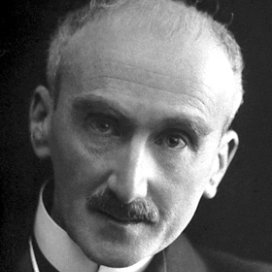French philosopher Henri Bergson was born in Paris on October 18 1859. At less than forty years of age, he became the most famous philosopher of his time, and his work has taken its place in the history of philosophy alongside those of the greatest authors. His pacifist ideas influenced the drafting of the Statutes of the League of Nations.
Of Polish descent on his father's side and English on his mother's, Bergson was the child of a Jewish family who immigrated to Paris, France. After a few years in London, the family returned to Paris, where Henri Bergson attended the Lycée Fontanes (later Lycée Condorcet). He entered theÉcolenormale supérieure in 1878, and came second to Émile Durkheim in the agrégation de philosophie examination in 1881. He then embarked on a career as a lycée teacher in Angers and Clermont-Ferrand. From these decisive years, when " thought collected, gathered and concentrated ", came a thesis that became his first book, Essai sur les données immédiates de la conscience, in 1889.
From 1898 to 1900, he spent two years teaching at theÉcolenormale supérieure, where his pupil was Charles Péguy, on whom Bergson exerted a great influence.
On January1 1900, Charles Lévêque wrote to the administrator Gaston Paris to inform him of Henri Bergson's candidacy for the chair of modern philosophy, which was also coveted by Gabriel Tarde. Tarde won, but Bergson eventually succeeded Lévêque, who died three days after his letter to Gaston Paris, in the chair of Greek and Latin philosophy, the title of which did not correspond to his work. It was only in 1904, following the death of Tarde, that he obtained a rare transfer to the chair of modern philosophy. He then left secondary education for good.
Elected to the Académie française, president of the Commission internationale de coopération intellectuelle (forerunner of UNESCO at the League of Nations), Henri Bergson was awarded the Nobel Prize for Literature in 1927 for " his rich and dynamic ideas, and for the brilliant way in which they have been presented ". In 1932, he published his last work, Les Deux Sources de la morale et de la religion. Although he wished to convert to Catholicism in the last years of his life, he remained faithful to Judaism out of solidarity with Jews persecuted by the rise of anti-Semitism. When he died on January 4 1941, tributes were paid to him despite the political context, notably by Paul Valéry.


